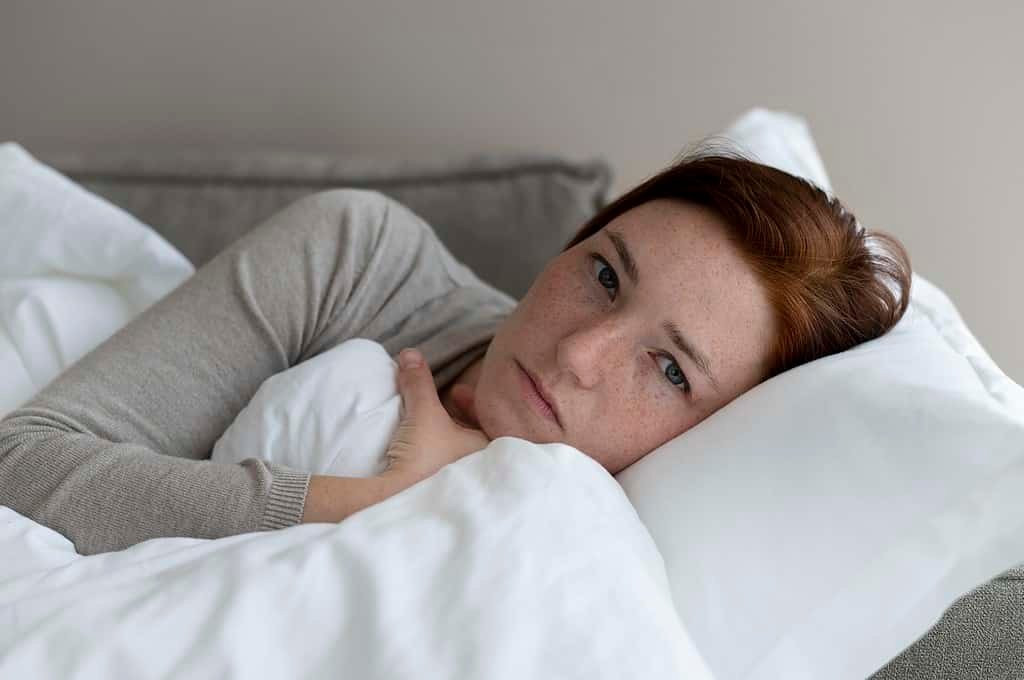What is Sleep Deprivation? Understanding the Causes and Effects
Understanding Sleep Deprivation
In exploring sleep deprivation, one must consider the duration of sleep and its quality. These facets contribute collectively to the overall health and efficiency of individuals across different age groups.
Definitions and Key Concepts
Sleep deprivation is a condition that arises when an individual does not obtain adequate sleep, leading to a lack of sleep or sleep deficiency. Sleep quality is equally vital, referring to undisturbed, restful periods that enable one to cycle through various stages of sleep, including REM sleep. An insufficient sleep pattern might be acute or chronic, impacting overall health.
Causes of Sleep Deprivation
Several factors contribute to sleep deprivation, from lifestyle choices to medical conditions. Common causes include:
- Stress and anxiety, often fueled by challenges at work or personal pressures.
- Consumption of alcohol and caffeine, which can disrupt sleep patterns.
- Sleep disorders such as sleep apnea and insomnia, which directly affect the quantity and quality of sleep.
Prevalence and Demographics
Sleep deprivation (NIH) affects all demographics but with varying prevalence. While adults generally require at least seven hours of sleep, children and teens need more due to their developmental needs. Age and ageing also play a role, with changes in sleep patterns commonly occurring as part of the ageing process.
Physiology of Sleep
Sleep physiology involves a complex interplay of brain activity and hormone release, crucial for restoring bodily functions. The sleep cycle includes several stages of sleep, transitioning from light to deep sleep before entering REM sleep. Circadian rhythms regulate sleep timing, coordinating with environmental light cues to signal when it is time to rest.
Consequences of Sleep Deprivation
Sleep deprivation wreaks havoc on both the body and mind, leading to several health concerns that can impair day-to-day living and overall quality of life.
Physical Health Impact
- Effects on the Cardiovascular System: Chronic sleep deprivation is associated with an increased risk of heart disease and cardiovascular disease. It can lead to high blood pressure and the development of type 2 diabetes, as ongoing lack of sleep affects the body’s ability to regulate blood sugar.
- Obesity and Immune System: Insufficient sleep is linked to weight gain and obesity due to an imbalance of the hormones that regulate hunger and appetite. The immune system also suffers, reducing the body’s ability to fight infections.
Mental and Cognitive Effects
- Memory and Concentration: A lack of sleep detrimentally impacts short-term and long-term memory and the ability to focus and concentrate, which are critical for daily tasks and work performance.
- Mental Health Disorders: Sleep deprivation can exacerbate symptoms of anxiety, depression, and irritability. It has also been noted as a contributing factor in the severity of bipolar disorder.
Risks and Safety Concerns
- Accidents and Errors: Slowed reaction time and reduced coordination due to sleep deprivation increase the likelihood of accidents, particularly drowsy driving, which is a significant cause of traffic-related incidents.
- Performance and Judgement: Inadequate sleep impairs cognitive functions, leading to more mistakes and errors in judgment, which can have severe consequences in professional environments.
Management and Prevention
Managing and preventing sleep deprivation involves a multifaceted approach that includes medical interventions for underlying conditions, adopting strategies for better sleep, and making conducive lifestyle changes. Addressing these aspects can significantly improve sleep quality and overall health.
Treatment and Medical Interventions
When sleep deprivation is due to a sleep disorder such as insomnia, a doctor may recommend a sleep study to diagnose the underlying problems accurately. In some cases, sleeping pills or melatonin supplements may be prescribed as a short-term solution. Continuous positive airway pressure (CPAP) machines can maintain open airways during sleep for conditions like sleep apnea.
- Medical Treatments:
- Sleep study evaluations.
- Prescribed medication.
- Use of CPAP for sleep apnoea.
Strategies for Better Sleep
Improving sleep hygiene is crucial for better sleep. This includes establishing a consistent bedtime routine, making the sleep environment conducive to rest, and avoiding stimulants before bed. Light therapy may benefit those struggling to regulate their sleep patterns, and cognitive behavioural therapy can help alter negative thought patterns associated with sleep problems.
- Sleep Hygiene Tips:
- Consistent sleep schedule.
- Optimal bedroom temperature, noise, and light levels.
Lifestyle Changes and Home Remedies
Lifestyle adjustments such as regular physical activity and a balanced diet enhance sleep quality. Avoiding napping during the day, especially close to bedtime, can prevent disruptions in nightly sleep patterns. Keeping a sleep diary may identify habits that contribute to sleep deprivation. Furthermore, techniques like relaxation exercises before bed can promote a smoother transition to sleep.
- Lifestyle Recommendations:
- Diet and exercise regimen.
- Relaxation before sleep.
Special Considerations
In exploring the intricate subject of sleep deprivation, it is imperative to consider its differential impact across various demographics, the interplay with contemporary lifestyles, and the ongoing scientific inquiries shaping our understanding.
Effects of Sleep Deprivation on Specific Populations
Children and teenagers need more sleep than adults to support their development and learning. Inadequate sleep can lead to mood changes and affect their performance at school. For adults, persistent sleep deprivation can exacerbate stress, diminish the quality of sleep, and increase susceptibility to illness. As individuals age, they may experience changes in sleep patterns, often leading to earlier bedtimes and wake times, but quality sleep remains paramount.
Impact of Technology and Modern Life
The advent of technology and social media has introduced new challenges to achieving sufficient sleep. Increased screen time before bed can impede the natural sleep cycle. Studies, including those from the Centers for Disease Control and Prevention, indicate the adverse effects of blue light on sleep quality, suggesting modern devices could contribute to rising health statistics related to poor sleep.
Research and Future Outlook
Current sleep studies examine the full range of the effects of sleep deprivation on health. With a growing body of research underscoring the importance of sleep, there is a clear need for continued investment in this area. New findings could lead to improved recommendations and tailored strategies that enhance sleep hygiene across all ages and lifestyles.
Key Takeaways
- Sleep Deprivation is characterised by not getting the minimum amount of sleep needed, typically around seven hours for adults.
- Health Risks associated with inadequate sleep include weakened immunity, increased risk of heart disease, and complications with mental health.
- Prevention strategies involve adhering to a regular sleep schedule, creating a restful environment, and limiting screen exposure before bedtime.
- In terms of Quality of Life, chronic sleep deprivation may result in decreased productivity and negative impacts on social relationships.
- Memory can be significantly affected; a lack of sleep impairs both the consolidation of new memories and the recall of existing ones.
- The ability to maintain Concentration and make decisions may be compromised due to reduced cognitive function.
- Mood swings and irritability are expected consequences, leading to potential exacerbation of mental health disorders.
Frequently Asked Questions
The following FAQs address common concerns around the implications of sleep deprivation and provide insights into managing and mitigating its effects.
What are the potential long-term consequences of insufficient sleep?
Insufficient sleep can lead to a variety of chronic health problems, such as heart disease, diabetes, and obesity. It may also increase the risk of developing psychiatric conditions like depression and anxiety.
How does sleep loss affect cognitive function and brain health?
Sleep loss can impair attention, alertness, concentration, and problem-solving, making learning more difficult. Chronic sleep deprivation may result in lasting brain damage, particularly in areas responsible for cognition and mood regulation.
Can prolonged sleep shortage compromise psychological well-being?
Prolonged sleep shortage can severely impact one’s psychological state, elevating stress levels and exacerbating mood disorders. Individuals may experience heightened irritability and difficulty managing stress.
What strategies are most effective for compensating for lost sleep swiftly?
To compensate for lost sleep, experts recommend quick fixes, such as short naps and improving sleep hygiene, along with strategies like consistent sleep schedules and avoiding caffeine and electronics before bedtime.
What are the immediate repercussions of not getting enough sleep?
The immediate effects of sleep deprivation include fatigue, decreased alertness, impaired memory, and mood swings. The body’s immune response can also be weakened, making one more susceptible to illnesses.
Is it possible to fully recover from the effects of chronic sleep deprivation?
While short-term deprivation can be somewhat remedied by catching up on sleep, it is unclear if long-term deprivation’s effects can be fully reversed. Continuous efforts to improve sleep patterns are crucial for mitigating these adverse effects.



